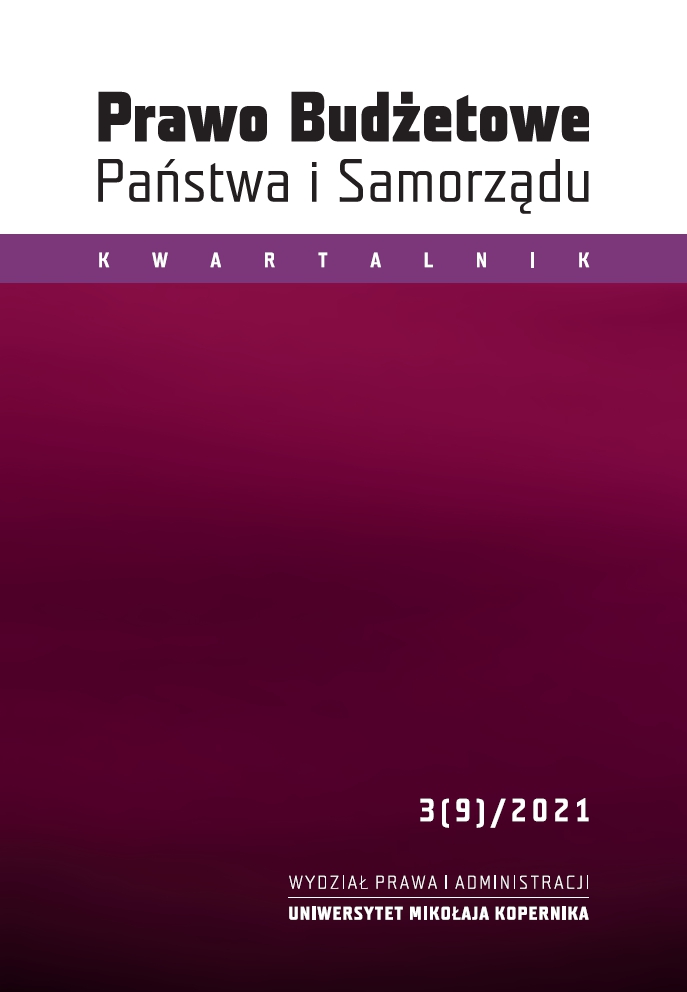Principles of granting compensation bonuses – substantive, legal and procedural issues
DOI:
https://doi.org/10.12775/PBPS.2021.013Keywords
budget subsidy, state’s bank, separate public fund, renovation projects, compensation bonus, limiting rentsAbstract
This article presents a status, functions and principles of granting and transferring compensation bonuses from the Thermomodernization and Renovation Fund. The Fund is supplied mainly with subsidies from the state budget. They are a form of a non-repayable support for investors who carry out renovations in multi-family or single-family residential buildings, respectively. Only natural persons who are owners or co-owners of buildings with a so-called “council flats” are entitled to compensation bonuses. Compensation bonuses are a form of co-financing of expenses incurred by investors for performance of renovation projects and, at the same time, compensation for losses incurred by them during the period of an application of statutory limitations which determined rents. Thermomodernization and Renovation Fund is administered by Bank Gospodarstwa Krajowego. In this way, the legislator created a mechanism of a non-repayable financial support for investors from public funds, but with the use of bank methods of assessing applications submitted for granting compensation bonuses. The study positively verified the thesis about a need to use such support for investors who, in order to improve their functionality, bear costs of a renovation of residential buildings with council flats. It has been shown that the bonus is deliberate, i.e. it is granted in connection with the implementation of a specific project by the owner or co-owner of the building.
References
Bańko M. (red.), Wielki słownik wyrazów obcych PWN, Wydawnictwo Naukowe PWN SA, Warszawa 2003.
Brzozowska K., Bankowa obsługa państwowych funduszy celowych w Polsce, „Folia Pomeranae Universitatis Technologiae Stetinensis – Oeconomica” 2010, nr 282, s. 21–30.
Janiszewska-Michalska M., Podstawowe pojęcia prawa budowlanego w orzecznictwie sądów administracyjnych, „Zeszyty Naukowe Sądów Administracyjnych” 2013, nr 5, s. 46–65.
Jędrzejewski J., Premia termomodernizacyjna, remontowa i kompensacyjna [w:] J. Jędrzejewski, D. Kafar, J. Kleina-Galińska, A. Kujaszewska, Termomodernizacja – dokumentacja, dofinansowanie, realizacja, C.H. Beck, Warszawa 2020.
Kosikowski C., Fundusze celowe nieobjęte ustawą o finansach publicznych [w:] C. Kosikowski, E. Ruśkowski (red.), Finanse publiczne i prawo finansowe, Wolters Kluwer, Warszawa 2008.
Lenio P., Państwowe fundusze celowe [w:] W. Miemiec (red.), Prawo finansów publicznych z kazusami i pytaniami, Wolters Kluwer, Warszawa 2020.
Ofiarska M., Premie remontowe przekazywane z Funduszu Termomodernizacji i Remontów – aspekty materialnoprawne i proceduralne, „Prawo Budżetowe Państwa i Samorządu” 2021, nr 1, s. 37–63, DOI: http://dx.doi.org/10.12775/PBPS.2021.003.
Ofiarski Z., Plany finansowe państwowych funduszy celowych – wybrane problemy dotyczące statusu materialnoprawnego i proceduralnego, „Prace Naukowe UE we Wrocławiu” 2018, nr 521, s. 112–121.
Rusin K., Premia kompensacyjna – teoria versus praktyka, „Nieruchomości” 2014, nr 3, s. 42–46.
Ruśkowski E., Finanse publiczne i prawo finansowe. Instrumenty prawnofinansowe i warunki ich stosowania, Wydawnictwo Temida 2, Białystok 2018.
Szołno-Koguc J., Funkcjonowanie funduszy celowych w Polsce w świetle zasad racjonalnego gospodarowania środkami publicznymi, Wydawnictwo UMCS, Lublin 2007.
Śleszyńska E., Obowiązki właścicieli obiektów budowlanych oraz inwestorów. Przegląd, konserwacja i roboty budowlane, Wolters Kluwer, Warszawa 2016.
Downloads
Published
How to Cite
Issue
Section
License
Copyright (c) 2021 Małgorzata Ofiarska

This work is licensed under a Creative Commons Attribution-NonCommercial 4.0 International License.
Stats
Number of views and downloads: 1524
Number of citations: 0
